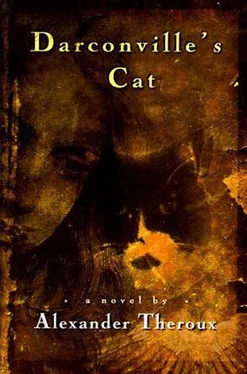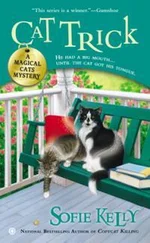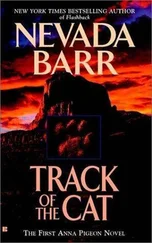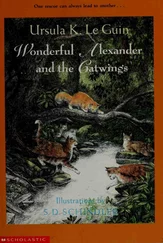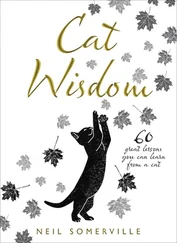This was not the doo-dah South of the Camptown Races, good bourbon, and the smell of honeysuckle in old shambling yards where at dusk one heard the sound of risible Negroes pocking out “Dixie” on hand-hewn banjos. It was far more dreadful and far less eloquent: a kind of cimmeria, a serviceable huggermugger of old wooden tobacco sheds; auction barns; too many hardware stores; a dismal shoe factory; and a run-down dairy bar into whose neon “foot-long hotdog” sign, at night, sizzled bugs blown in by the stale breezes of the dung-drab Appomattqx River which sludged along its fosses of spatterdock and alligator weed and milfoil. The freight train Darconville had heard but hadn’t yet seen chugged through town once in a while on its way to Cincinnati, but as it had long ago stopped taking on passengers, the station had fallen into disrepair. The town came to an abrupt halt at both ends, a foolish watertank marking the limits on one side and the other giving way to a region of fat-farms and open fields which, several times a year, suddenly sprouted up tents soon to be all faffed up with the trivialities of the camp-meeting and the chatauqua harangue, the county fair and the vote-rousing picnic. But these were special events.
During most of the year, the brass-jewelry tastes of its citizens — you knew them by string ties, brutal haircuts, and snap-brim hats, with fishhooks and lures, advertising things like “Funk’s Hybrid” or “Wirthmore Feeds”—ran to little more than a general enthusiasm for church bake-offs, barbershop gossip, and all that hand-me-down bumpkinry touching on Bryanism, vice-crusading, and prohibition. It was a town nonascriptive, nonchalant, and nonentitative, one of those places that lent itself to uneasy jokes or gave rise to dismissive quips, like “I spent a whole week there one Sunday” or “It’d be a great place to live if you were dead” or “I visited there once, but it was closed.”
“Look,” pointed Miss Trappe, coming to a halt. “I never see him without thinking, for some reason, of my father.” The statue of a sinople-green Confederate soldier, so common in Southern communities, stood above them on a granite pediment, surrounded by cannonballs, with a dapper Van Dyke beard, a bandolier, a rifle-at-the-ready, and a chivalric squint into the heart of the legitimacy of states’ rights, honoring those who died — so read the inscription—”in a just and holy cause.” He was the Defender of State Sovereignty. He stood there in all weather, unphased by birdlime or pigeons. He never flinched. “My father left us, you know. I was only a child, but almost died of shame. Oh yes, but that was long ago, and, besides,” she sighed, “that, as they say, was in another country.”
The main buildings of Quinsy College could now be seen across the street, a cloister of white columns running along by way of a portico. Disquisiting, somewhat abstractly, on the college’s history, Miss Trappe stepped off the sidewalk. Suddenly leaping back to the curb— peevishly screeching, “ You !”—she saved her toes, just, as a green pickup truck with an armament rack at the back window whipped out onto High St. and raced toward Main, pedal to the metal. The driver, an underscullion with a face like a knife, called out something vile.
Miss Trappe and Darconville continued walking, a strange little mock-up — a skeptical Dante, a wizened Beatrice — in a most un-paradisaical world: a matchbox-sized theatre, an ice-cream shop, and the old Timberlake Hotel, with its chintz curtains, upon whose shaded veranda sat several cut-to-the-pattern townies slumped in black-lacquered wicker chairs and several careworn arteriopaths, hunched up like angry hawks, fussily presiding over a game of dominoes. “Percy,” came a squawk, “you ain’t got enough strength to pull a greasy string out of a goose’s ass.” A slam followed. “Move!” Miss Trappe shook her head. “I had a brother,” she said, out of the blue, “who always played chess with me. We wouldn’t consider dominoes.” She paused. “He married, lost his wife to another, took to drink—” A distinct sorrow came into her eyes.
“And is he—”
Miss Trappe made a cataphatic nod. “By his own hand. He was twenty.” She sighed and stumped along. “ ‘The rigor of the game,’ “ she said, “as Mrs. Battle would say.”
They came to Quinsyburg’s main street. It was a contingent, down both sides, of shoulder-to-shoulder shops, a frontage dull and repetitious but saved from the blight of uniformity by cute mercantile jingles painted on each window — the poetic effusions of various local struld-brugs and place-proud retailers — which in small towns, for some peculiar reason, become such a rich source of humor: United Dixiebelle Cup Co. (“Even Our Name Begins with You”); Quinsyburg Bedding Co. (“We Give You a Lot of Bunk”); The Old Dominion Outlet (“If Your Clothes Aren’t Becoming to You, You Should Be Coming to Us”); Stars ‘N’ Bars Exterminating Co. (“All Our Patients Die”); Piedmont Travel Service (“Please Go Away”); Southside Rug and Linoleum (“The Best Floor Show in Town”); The Virginia Shook Co. (“We’ll Stave You In”); The Quinsyburg Gun Shop (“The First to Last”); and The Prince Edward Lumber Co. (“May We Strike a Cord for You?”)
The Southern town, a parody of itself, is the prototype from which every other one is copied. Where is the one, for instance, that doesn’t have a radio announcer named Don Dale; a private white academy; Muddy Creek; a chili-dog emporium; the State theatre; Jaycees with berry-knotted ties; a sheriff called “Goober”; something like the ol’ Shuckcorn Place (it’s always supposed to be haunted by J. E. B. Stuart); a popular delivery boy-cum-halfwit named Willis Foster; and a local NRA enclave that meets upstairs in the gunshop every Friday night to tell lies and make up stories about niggers, nymphomania, and New York City?
Darconville and Miss Trappe took time for tea at the Seldom Inn (“A Place to Remember for Cares to Forget”) — a popular meeting place downtown for the professional tie-and-jacket faction (booths) who rotated matchbooks and told loud interminable tales and various peckerwoods (stools) who gripcruppered their coffee cups from the non-handle side and stared into a stippled wall-mirror at their chinless faces and pointed ears. The jukebox was blaring country music— Kitty Wells, “Honky Tonk Angels”—making it impossible to talk, so Darconville and Miss Trappe together watched through the window as the Quinsyburg townsfolk passed by, peculiar people on the hop, remarkably alike all, with faces like the trolls on German beer mugs, the curious result, perhaps, of poultry-like inbreeding (farmers, farmers’ daughters, farmers’ daughters’ farmers) that had transmogrified a once vital eighteenth-century Protestant Celtic stock into a hedgecreeping lower-class breed of joltheads and jusqu’ aubouts and then metastasized into one huge gene pool which seemed to reach from the bulletheaded truckers of Mississippi to the triple-named senators of Virginia, slackjawed and malplasmic to a one. It seemed an orgy of kin, with everybody anybody’s cousin.
It was a burlesque subordinating individuality to a constant reference of type. Quaeritis habitantes ? Rotarians; wood-hewing gibeonites; 32° Masons and their ball-jars; pushing tradesmen; zelators and zélatrices; Odd Fellows of indecipherable worth; Hemerobaptists; racist Elks (B!P!O.E.) and their shovelmouthed wives, usually named Lorinda or Moxone; psalm-snufflers; longnosed umbrella-carrying joykillers; widows with applepandowdy faces; Volsteaders; rattle-toothed almsters; gout-footed Shriners; tiny birdheaded clerks in red suspenders; supposititious chamberers of commerce; pullulating boosters; and cretinous, peasant-like Colin Clouts on every street corner who slunched against poles squinting and chewing down toothpicks in a slow watchful rhythm.
Читать дальше
